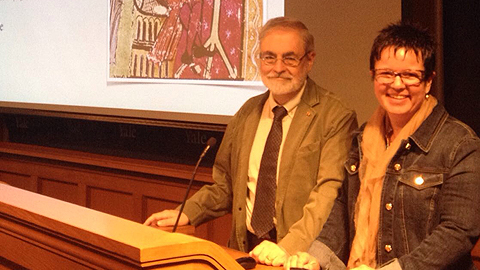Chartae Latinae Antiquiores Cataloniae published

04/10/2017
One of the most important collective academic tasks undertaken in the field of Palaeography and Diplomatics is the Chartae Latinae Antiquiores series. Its objective is to put together palaeography and diplomatic, and when necessary historical and cultural commentaries in a faithful series which includes real-size photographies of all of the original documents from the 9th century and before.
Catalonia recently joined the project with the recent publication of Chartae Latinae Antiquiores Cataloniae, in two volumes, Volume 112 and Volume 113, which includes a total of 97 diplomas, studied and edited by Dr Jesús Alturo, Professor in Palaeography, Codicology and Diplomatics at the Department of Antiquity and Middle Ages Studies, with the collaboration of pre-doctoral researcher Tània Alaix.
The first of the two volumes contains the study of 49 documents conserved in the National Library of Catalonia and the archives of the Barcelona Cathedral, the Crown of Aragon and the Episcopal Library of Vic. The second volume includes the "chartae" of the archives of the Girona and the Seu d'Urgell Cathedrals, and the library of Peralada.
According to the authors, these diplomas “make up the strongest documental foundations, from a historical and cultural point of view, on which the origins of the formation of our country is based”.
The Chartae Latinae Antiquiores series began in 1954, directed from the beginning by its founders, Professors Albert Bruckner and Robert Marichal. The volumes, organised by political states, and not countries, and therefore by location and not origin, are painstakingly published by the Urs Graf publishing house in Zurich.
The volumes created now by UAB researchers, as with the rest of the series, is published under the auspices of the Pontificia Accademia Romana di Archeologia (Vatican City), the Union Académique Internationale (Brussels), the Comission Internationale de Diplomatique (Brussels), the Schweizerische Gesellschaft für Geisteswissenschaften (Bern), the Allgemeine Geschichtforschende Gesellschaft der Schweiz (Laussane), the Koninklijke Nederlandse Akademie van Wetenschappen (Amsterdam), the Letteren en Schone Kunsten van België (Brussels), the Mediaeval Academy of America (Cambridge, Massachusetts), the Royal Irish Academy (Dublin), the British Academy (London), the Bayerische Akademie der Wissenschaften (Munich), the Académie des Inscriptions et Belles-Letres (Paris), the Accademia Nazionale dei Lincei (Rome), the Kungliga Vitterhets Historie och Antikvitets Akademien (Stockholm), the Österreichische Akademie der Wissenschaften (Vienna) and the Real Academia de la Historia (Madrid).
Professor Jesús Alturo, member since 1997 of the Comité International de Paléographie Latine, the maximum organisation of academics in Latin Palaeography and Codicology worldwide, is also the founder of the Palaeography, Codicology and Diplomatics seminar at the UAB, a consolidated research group which has directed 19 research projects with funding from the Spanish Ministry for Education and Culture, and by the Government of Catalonia. He has also directed eight PhD theses and is author of more than 250 publications, including books, chapters and papers appearing in prestigious local and international journals.
He is currently director of the Series Hispanica dels Monumenta Palaeographica Medii Aevi, another large international project receiving support from the top academies and institutions in the Western world, among them the Real Academia de la Historia (Madrid) and the Reial Acadèmia de Bones Lletres de Barcelona.
More information about the Chartae Latinae Antiquiores series